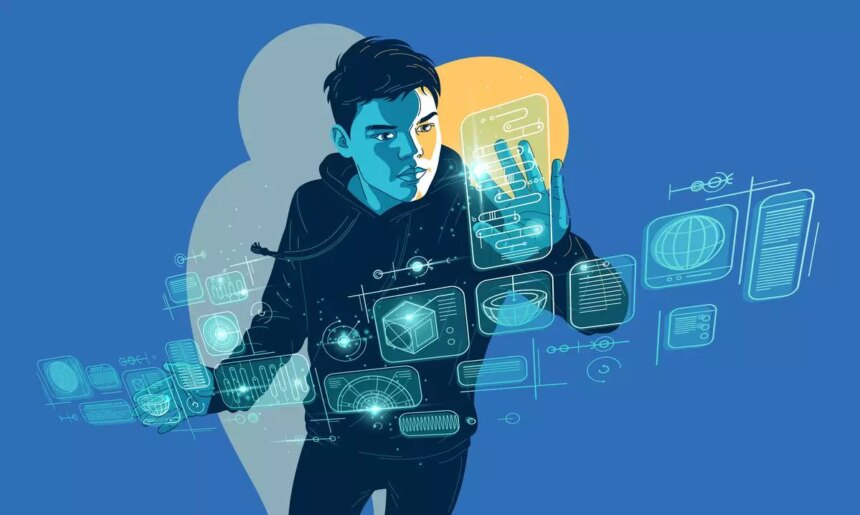As India’s loss-making edtech companies face investor pressure to post profits, they are quickly learning that artificial intelligence (AI) could be their knight in shining armor – personalized learning experiences based on AI help retain students on these platforms. .
On Bangalore-based math tutoring platform CueMath, for example, teachers use AI to generate prompts that help students solve problems, making it a 1:2 session for the student.
“We are confident that these AI assistants would be of great help to our teachers who are taking 1:4 (group) lessons,” says Manan Khurma, founder and CEO of CueMath.
As funding becomes scarcer, Indian edtech startups like Vedantu, Scaler and Emeritus are trying to use AI to boost their efficiency, growth and scalability.
From learner grading to customer support, innovative assessment methods, content creation, higher education and upskilling, AI deftly lends a helping hand, according to several e-tech companies and industry experts.
“AI allows us to better understand the needs of our learners, identify skills gaps in the market, and respond to relevant topics,” says Bhushan Heda, COO at Emeritus.
Unique learning modes
Vedantu co-founder and CEO Vamsi Krishna says the edtech is integrating AI into its products and educational content to create an “immersive and personalized” educational experience.
“Through AI, we are working to provide students with on-demand access to their precise needs. This approach allows each student to interact with the educational materials in a way that matches their unique learning preferences, ensuring that learning is as effective and efficient as possible,” he says.
Vedantu says it is investing nearly $2 million per year in AI across multiple projects, with the investment increasing based on the value creation of each project.
Edtech major Scaler has introduced an AI-based teaching assistant that runs on OpenAI’s flagship product, GPT-4.
The company says there has been an increase of more than 33 percent in the number of learners using the tool to solve problems without the intervention of a human teaching assistant.
“Initial expenses, including research and development, were approximately $250,000, with a one-time cost of approximately $20,000 associated with training the custom GPT-4 model,” says Abhimanyu Saxena, co- founder of Scaler and InterviewBit.
Beyond educational use
Edtech companies are using emerging AI technology to also refine other areas of their business, such as sales and marketing.
Emeritus says marketing is a key area where AI plays an important role for the business, as it helps target the right audiences.
“We operate at scale globally, working with learners in over 80 countries around the world, and AI helps us optimize marketing spend,” says Heda.
For Vedantu, AI-based tools have helped improve the quality and structure of its textbooks and academic content, as well as in the design of marketing campaigns, it says.
Scaler places particular emphasis on the cost factor, emphasizing that AI has enabled the company to achieve substantial savings.
“When a human, especially someone with specialized expertise like a software engineer, spends 15 minutes helping a learner, the cost can exceed $20, considering the minimum wage in the United States, which often reaches $15 . In contrast, our AI teaching assistant incurs only a fraction of this expense, typically no more than 10 cents per interaction, which translates to savings of almost 100%,” says Saxena.
CueMath is exploring the use of generative AI to assist in its curriculum development by generating content for mathematics learning, practice and exam preparation.
“As we delve deeper into this area, we will realize that generative AI has the potential to revolutionize the entire edtech sector,” says Utpal Chakraborty, an AI and quantum scientist who is Gartner Ambassador for Data and Analytics.
Human factor
Edtech companies, while enthusiastically adopting AI, also emphasize that human supervision is indispensable, as teachers play a crucial role in creating meaningful learning experiences and developing students.
Heda, CEO Emeritus, observes that the use of AI would not necessarily mean a reduction in the human workforce.
“Rather, it’s about leveraging our human workforce and AI to enhance the learning experience and achieve optimal results,” he says.
Some learners prefer to engage in conversations with human teaching assistants, says Saxena of Scaler.
“Human teaching assistants are better equipped to understand the deepest, most complex nuances of being human. Human interaction is crucial for learning by resolving doubts in a healthy way, as it involves deeper understanding and empathy compared to interacting with AI robots,” he explains.
AI should be seen as a powerful tool that can enhance and complement human capabilities rather than replacing them, says Akshay Munjal, CEO and founder of Hero Vired, a learning technology company offering training programs tailored to industry for students and professionals.










